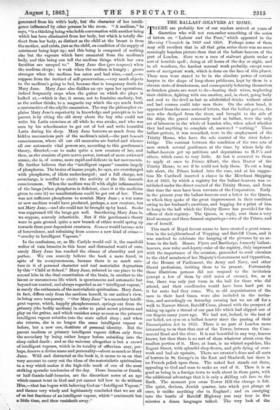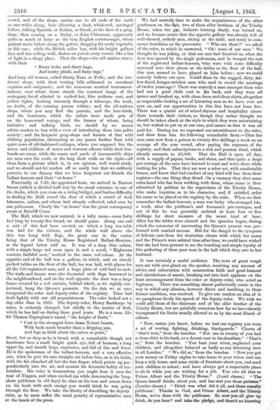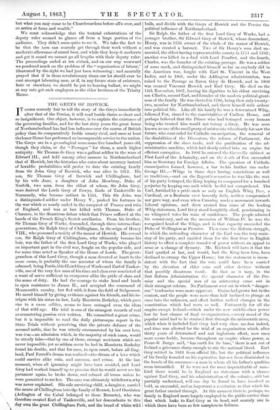THE BALLAST-HEAVERS AT HOME.
THERE are probably few of our readers arrived at years of discretion who will not rem ember something of the series of letters on "Labour and the Poor," which appeared in the Morning Chronicle in 1849 and 18,50. Perhaps some of them may still recollect that in all that grim series there was no more seemingly hopeless picture than that of the ballast-heavers of the port of London. Here were a race of stalwart giants under a sort of horrible spell ; doing at all hours of the day or night, and in all weathers, the hardest manual work probably, except some sorts of navigators' work, which is done on the face of this planet. These men were stated to be in the absolute power of certain harpies in the shape of long-shore publicans, kept by them in a chronic state of drunkenness, and consequently behaving themselves as drunken giants are wont to do—beating their wives, neglecting their children, fighting with one another, and, in short, going body and soul to the devil as fast as adulteraied drinks without stint and bad courses could take men there. On the other hand, it appeared from the same series of letters, that the ballast getters, the men who dredged from the river, and brought to the side of the ships, the gravel commonly used as ballast, were the only set of labourers in the whole of London who, when asked whether they had anything to complain of, answered "nothing." These ballast-getters, it was remarked, were in the employment of the Trinity House, who have the sole control of the river below- bridge. The contrast between the condition of the two seta of men struck several gentlemen at the time, by whose help the ballast-heavers got up petitions and deputations to M.P.'s and others, which came to very little. At last it occurred to them to apply at once to Prince Albert, the then Master of the Trinity House, to see if he could not help them. To cut a long tale short, the Prince looked into the case, and at his sugges- tion Mr. Cardwell inserted a clause in the Merchant Shipping Act of 1863, by which a registry for the ballast-heavers was es- tablished under the direct control of the Trinity House, and from that time the men have been servants of the Corporation. Early in the present year the ballast-heavers sent a letter to the Queen, in which they spoke of the great improvement in their condition owing to her husband's exertions, and begging for a print of him tob ang in the hall which the Trinity House has providei for the offices of their registry. The Queen, in reply, sent them a very kind message and three framed engravings—two of the Prince, and one of herself.
This mark of Royal favour seems to have created a great sensa- tion in the neighbourhood of Wapping and Ratcliff Cross, and it was resolved to celebrate the hanging of the pictures by an at- home in the hall. Messrs. Flynn and Barthorpe, formerly ballast- heavers, now ruler and deputy-ruler of the registry, duly impressed With the importance of the occasion, proceeded to send circulars to the chief members of her Majesty's Government and Opposition, of the Houses of Parliament, the Army and Navy, and other liberal professions, inviting them to be present. Fortunately those illustrious persons did not respond to the invitation (except a few of them by civil notes of excuse), for, as it was, there was only just room in the hall for those who did attend, and their excellencies would have been hard put to it for seats had they come. We, as old acquaintances of the men in their hard times, were also included in the invita- tion, and accordingly on Saturday evening last we set off for a walk to Narrow Street, Ratcliff Cross, pleased with the prospect of taking up again a thread of our past life which had slipped out of our fingers many years ago. We had not, indeed, to the best of our belief, set eyes on a ballast-heaver since the passing of their Emancipation Act in 1853. There is no part of London more interesting to us than that east of the Tower, between the Com- mercial Road and the river. It is not beautiful in any way, heaven knows, but then there is no sort of sham whatever about even the smallest portion of it. Here, at least, is no whited sepulchre, like Regent Street, with splendid shop-fronts, and girls dying of over-
work and bad air upstairs. There are sweater's dens and all sorts of horrors in St. George's in the East and Shadwell, but there is no French polish upon them. The naked fact stands out there, appealing to God and man to make an end of it. Then it is as good as being in a foreign town to walk about in those parts, with the additional advantage that it is only a shilling cab fare to the Bank. The moment you cross Tower Hill the change is felt.
The quiet, devious, Jewish quarter, into which you plunge at once, is unlike anything else in England ; and on emerging into the bustle of Ratcliff Highway you may hear in five minutes a dozen languages talked. The very look of the crowd, and of the shops, carries one to all ends of the earth as one walks along, here elbowing a dark, whiskered, earringed fellow, talking Spanish, or Italian, or Greek, at the door of a grog- shop ; then coming on a Malay, or John Chinaman, apparently quite as much at home as the very English costermonger, whose patient moke loiters along the gutter, dragging his seedy vegetable or fish van ; while the British sailor boy, with his bright gallant face and free rolling walk, flashes on you at every corner, like a bar of light in a dingy place. Then the shops—the old marine stores, with their "Rusty locks, and dusty bags, And musty phials, and fusty rags," And lusty old women, called thirsty Nans or Polls ; and the out- fitters' shops, with their touting bills addressed to merchant captains and emigrants ; and the numerous nautical instrument- makers, over whose doors stands the constant image of the mahogany-faced admiral in cocked-hat, blue uniform coat, and yellow tights, looking intensely through a telescope, the work, no doubt, of the cunning person within ; and the all-nations shops, where you may find the parrots, and the love-birds, and the beastesses, which the sailors have made pets of on the homeward voyage, and the former of whom, being imitative and talking birds, we should by no means advise readers to buy with a view of introducing them into polite society ; and the frequent grog-shops and haunts of that wild shifting population, alternating as one passes farther East with quiet rows of old-fashioned cottages, where (we suppose) live the wives and children of mates and warrant officers while their hus- bands are away, while the masts and yards of innumerable shire are seen over the roofs, or the long dock walls on the right—all these form a picture which is, in our opinion, well worth study, and we should not let readers off so easily but that we suddenly perceive to our dismay that we have forgotten our friends the ballast-heavers and their" at-home."
Punctually at 7.30, the appointed hour, we arrived in Narrow Street (which is divided half-way by the canal entrance to one of the docks, which you cross on a swing bridge), and had no difficulty in finding the Hall, round the door of which a crowd of dock labourers, sailors, and others had already collected, ruled over by one policeman. Clearly the "at-home" was the great cotemporary event at Ratcliff Cross.
The Hall, which we now entered, is a lofty room—some forty feet long by twenty-five broad, we should guess. Along one end a sort of dais had been erected, on which a long tea-table was laid for the visitors, and the whole wall above the dais was hung with flags, the great one in the centre being that of the Trinity House Registered Ballast-Heavers, as the legend below told us. It was of a deep blue colour, with a simple large red cross upon it, and a scroll, "Righteous masters, faithful men," worked in the same red colour. At the opposite end of the hall was a gallery, in which, and on closely packed tables on the floor of the hall, tea was laid, with places for all the 150 registered men, and a huge plate of cold beef to each. The walls and beams were also decorated with flags borrowed in the neighbourhood, and on the wall opposite the door was a large frame covered by a red curtain, behind which, as we rightly con- jectured, hung the Queen's presents. On the dais we at once recognized the ruler and deputy-ruler of the registry. Time had dealt lightly with our old acquaintances. The ruler looked not a day older than in 1853. The deputy-ruler, Henry Barthorpe by name, is certainly changed, but chiefly in the matter of flesh, which he has laid on during these good years. He is a man, like Sir Thomas Erpingham's vassal, "the knight of limbs," "Cast in the strongest form dame Nature boasts, With back much broader than a dripping pan, And legs as thick about the calves as posts," Short, but as deep as he is broad, with a remarkable though not handsome face, a small bright quick eye, full of humour, a long upper lip, and mouth large, expressive, and full of fun and force. He is the spokesman of the ballast-heavers, and a very effective one, when he gets his arm straight out before him, as is his habit, with the fist clenched all but the fore finger, which points up per- pendicuLsrly into the air, and mounts his favourite hobby of tee- totalism. His voice is tremendous, you might hear it over the roar of Niagara, and when excited (as while denouncing the 'long- shore publicans in old days) he rises on his toes and comes down on his heels with such energy you would think he was going through the floor. We take the liberty of describing the deputy ruler, as he must suffer the usual penalty of representative men at the hands of the press.
We had scarcely time to make the acquaintance of the other gentlemen on the otitis, two of them elder brethren of the Trinity House, when the gks, hitherto burning dimly, was turned on, and we became aware that the opposite gallery was already full of well-dressed, orderly men, sitting at the table, and ready to coxn- mence hostilities on the provender. "Who are those?" we asked of the ruler, to which he answered, " Oh ! some of our men." We thought he VMS joking, or that our ems had deceived us, when the door was opened by the single policeman, and in trooped the rest of the registered ballast-heavers, 'who were with some difficulty squeezed into their places at the tables on the floor of the hall. Our ears seemed to have played us false before ; now we could scarcely believe our eyes. Could these be the ragged, dirty, 6a1- low-faced, hunger-stricken men who used to crowd the meetings of twelve years ago ? There was scarcely a man amongst them who had not a good cloth coat to Os back, and they were all spruce and brushed up, with clean faces and clean shirts, altogether as respectable-looking a set of labouring men as we have ever set eyes on, and our opportunities in this line have not been few.. There was a quaint air of mixed shyness and hospitality about them towards their visitors, as though they rather thought we should be taken aback at the style in which they were entertaining us, but wished to put us at our ease, and assure us that it was all paid for. During tea we expressed our astonislunent to the ruler, and drew from him the following remarkable facts :—That the men earn now from a guinea to twenty-five shillings a week on an average all the year round, after paying the expenses of the registry, and their subscriptions to a sick and pension fund, which already amounts to £3,000. That the Hall is open all day, with a supply of papers, books, and slates, and that quite a large per-centage of the men have learned to read and write there while waiting for jobs. That they are now a sober set, with comfortable homes, and know that bad conduct of any kind will lose them their register—the one thing they dread. On a vacancy they elect some extra hand who has been working with them, whose name is then submitted by petition to the supervisors of the Trinity House, who make inquiries as to his character, and, if satisfied, order his name to be placed on the registry by the ruler. When we first remember the ballast-heavers, a man was lucky who averaged 14s. a week, after the publican's and foreman's per-centages, and out of this he was generally mulcted at least four or five shillings for short measure of the worst kind of beer.. After tea the tables were cleared and the speeches began, during which the ceremony of uncovering the Queen's present was per- formed with marked success. But for the danger to the tympana. of delicate ears from the stentorian cheers with which her name and the Prince's were saluted time after time, we could have wished that she had been present to see the touching and simple loyalty of this gathering of these poor men in the hall which they owe to her husband.
It was certainly a model audience. The rows of great rough men sat with eyes glued on the speaker, receiving any amount of advice and exhortation with measureless faith and good humour and ejaculations of assent, breaking out into loud applause on the least encouragement from the ruler or deputy-ruler, who acted as fuglemen. There was something almost pathetically comic in the way in which any allusion, however direct and insulting, to their former condition, was received. To give our readers an idea of it we paraphrase freely the speech of the deputy-ruler. We wish we could add those of the chairman and of the elder brother of the Trinity House, but are painfully conscious how far we have already transgressed the limits usually allowed to us by the most liberal of editors.
"Now, mates, you know, before we had our registry you were a set of rowing, fighting, drinking, blackguards." Chorus of that's true," from the benches. "Not one in twenty of you had a clean shirt to his back, or a decent coat to his shoulders." "That's so," from the benches. "You beat your wives, neglected your children, and altogether behaved as badly as any labouring men in all London." "We did so," from the benches. "Now you get your money on Friday nights to take home to your wives, and can keep a tidy home, and some sticks of furniture about you, and send your children to school ; and have always got a respectable place to sit in while you are waiting for a job. You owe all that to Prince Albert and the Trinity House." (Loud cheers.) "The Queen herself thinks about you, and has sent you those pictures." (Louder cheers.) "Drink was what did it all, and those rascally pulilicans I Thanks to God, and Prince Albert, and the Trinity House, we've done with the publicans. So now you all give up drink, do you hear? and take the pledge, and there's no knowing but what you may come to be Churchwardens before all's over, and so arrive at fame and wealth."
We must acknowledge that the teetotal exhortations of the deputy ruler seemed to glance off from a large portion of the audience. They didn't seem quite to see it. We take the fact to be that the men can scarcely get through their work without a moderate allowance of sound beer, and while they keep it moderate and get it sound we cannot go all lengths with their deputy ruler. The proceedings ended at ten o'clock, and on our way westward we pondered much on the problem of the "organization of labour,'' illustrated by the sight we had just been witnessing ; and mentally prayed that if in these revolutionary times our lot should ever be cast amongst labouring men, or if, in any future state of existence, here or elsewhere, we should be put to heaving ballast, we might at any rate get such employers as the elder brethren of the Trinity House.
































 Previous page
Previous page